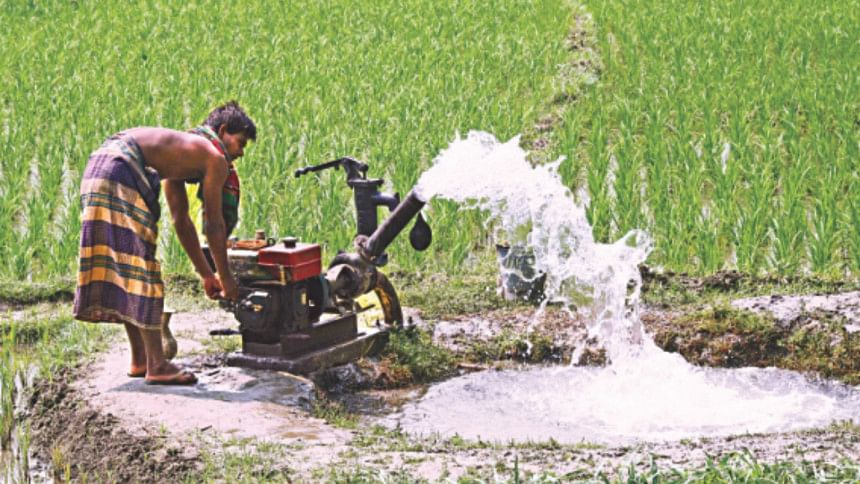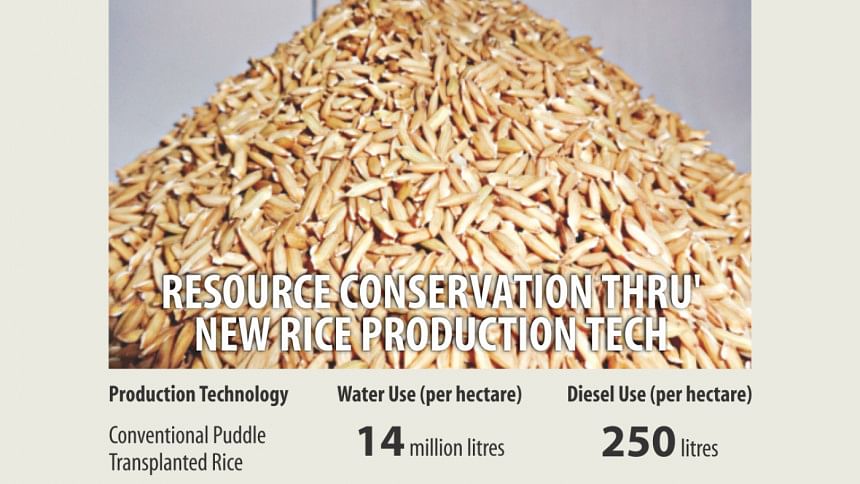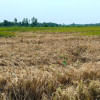The water saver

It takes 14 million litres of irrigation water to produce six tonnes of Boro rice on one hectare of typical farmland in Bangladesh.
A farmer has to burn 250 litres of diesel to run a shallow pump, owned or hired, to irrigate this single hectare of paddy field.
If translated into minuscule unit, each kilogramme of rice reaches our plates from the farm at the expense of 3,500 litres of immensely valuable fresh water.
And one agronomist took it upon himself to see what difference he could make in terms of water conservation and saveBangladesh from an ecological disaster.
Irrigated-rice Boro contributes 55 percent of Bangladesh's nearly 35 million tonnes of yearly rice output and heavily sucks on a rapidly depleting groundwater.
Professor Moshiur Rahman, who teaches agronomy at Bangladesh Agricultural University (BAU) in Mymensingh, negated the notion that rice in dry season has to grow in puddle condition, soaked field and in standing water.
Moshiur wanted to challenge the notion and began with an on-campus experiment back in 2006-07. In the last 10 years, Moshiur reached out to plots of many farmers in six rice-rich districts, and today he is ready to show the results -- rice can be grown using less than half the irrigation water in Boro season.

“What we'll do, we'll not grow seedlings in the nursery and we'll save water there. We'll directly sow in the dry field by ploughing furrows and no need to puddle or soak the field with water, thereby save some water as well. We'll only keep standing water in the paddy field during the period between panicle initiation and grain-filling and that's it,” Moshiur, who received a doctorate from New Zealand's Lincoln University, explained to The Daily Star.
In the direct-seeded Boro rice technology, Prof Moshiur said, what farmers would require to do is keeping the seeds soaked in water for 24 hours and then incubate the soaked seeds for another 30 to 40 hours prior to sowing in the paddy field.
From the results of his experiments with the direct-seeded rice technology in Rajshahi, Rangpur, Dinajpur, Tangail, Netrokona and Mymensingh over the last 10 years, Moshiur showed statistical evidence that in the most conservative estimate, 50 percent less water was required for growing rice with equally productive yield.
The Ministry of Agriculture (MoA), which has been under pressure for overexploitation of groundwater in irrigation and has long been on the lookout for alternatives, felt relieved at the initial news of Moshiur and his team's success in developing water-conserving Boro production technology.
The MoA has now showed a great deal of interest in listening to Prof Moshiur and to give the direct-seeded technology a try. Agriculture Minister Matia Chowdhury would be listening to him, as Moshiur has been invited to give a presentation on the water-saving rice production technology before a scientific audience in the city today.
As this correspondent met the BAU professor yesterday, Moshiur asserted if a large part of the country's nearly five million hectares of Boro land is brought under the direct-seeded rice cultivation system, it would save a lot of water, an overwhelming 90 percent of which are now drawn from the fast-depleting groundwater.
“It's going to be a great cost-saver too. Over 1.6 million privately-operated shallow tube wells as well as some public sector-run deep tube wells together consume 10 million litres of diesel and a 1,000 megawatts of electricity a day during peak Boro season. We can expect straightaway halving the volume of diesel and power consumption for irrigation purpose,” hoped Prof Moshiur.
Around 88 percent of total fresh water is used for agriculture in the country and rice production accounts for 73 percent of that water. The UN Food and Agriculture Organisation (FAO) stated in a report, “In some parts of the country, particularly the Barind Tracts in the northwest region, there are already symptoms of deterioration in the natural hydrological regime. Declining groundwater levels have affected water quality causing it to affect soils, the growth of agricultural crops, flora and fauna and to increase health hazards.”

 For all latest news, follow The Daily Star's Google News channel.
For all latest news, follow The Daily Star's Google News channel. 








Comments